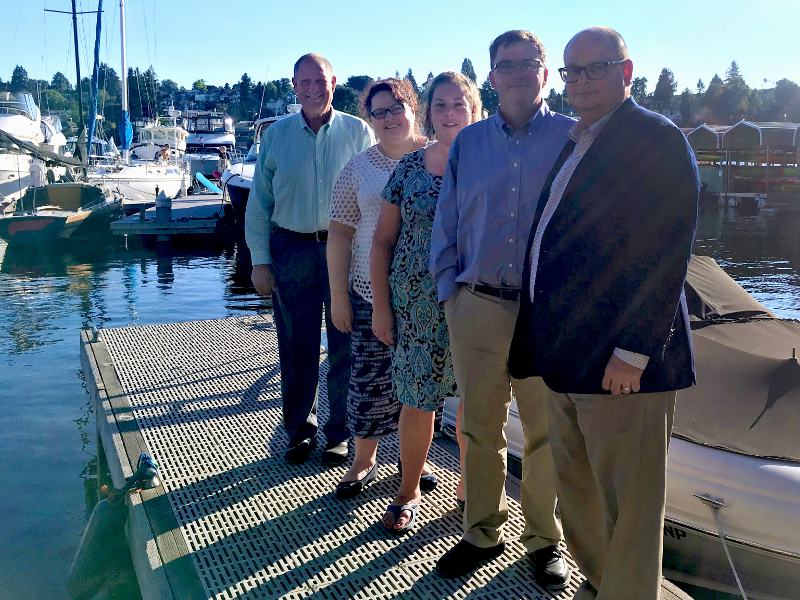Interprofessional Leadership Fellows
Purpose & Goal
The purpose of the IPER Interprofessional Leadership Fellows (IPL) Program is to develop the leadership capacity of health sciences faculty in the area of interprofessional education (IPE) and collaborative practice (IPP). The goal is to increase the number of faculty who can apply best practices for developing and implementing IPE across the HSC in order to contribute to an interprofessional culture of excellence.
- Participate in a monthly IPL learning community hosted by IPER. Sessions offer structured discussions and training around IPE, and provide support for completing team projects and subsequent scholarship.
- Attend two fully funded Texas IPE Consortium meetings during the 18-month program (spring and fall).
- Attend and fully participate in the Train-the-Trainer Interprofessional Team Development Program, otherwise known as T3. This immersive 3.5 day leadership-training program was developed for teams wanting to learn how to design and implement effective interprofessional education and collaborative practice projects at their institutions.
- Work with faculty from other HSC colleges to develop and execute an interprofessional learning project. This will require communication and meetings outside of the IPER-hosted learning community.
- Submit a final report of the project to IPER by August 31, 2021.
- Present project results at the IPER Symposium in 2022.
To be considered as an IPL Fellow, an applicant MUST:
- Attend the T3 training in its entirety.
- Commit to attending learning community events hosted by IPER from January through April and September through December
- Note: We understand that Fellows might not be able to attend all learning community sessions. Absences will be handled on a case-by-case basis.
- Commit to working with a project team for the duration of the fellowship, including meetings outside of IPER-hosted learning community events.
- Commit to presenting (or contributing to a presentation for) IPER Symposium
- Prioritization will be given to applicants who:
- Demonstrate significant interest in increasing the reach of IPE within their college, across the HSC, at TAMU, and beyond
- Have some experience in IPE activities or initiatives
- Add to the diversity of disciplines represented in the IPL Fellows cohort
- IPL Fellows will be selected based on:
- Review by HSC IPE Leadership Team or their proxies
- Approval and endorsement by applicant’s Dean
- Note: The IPER Interprofessional Leadership Fellows Program is patterned after the University of Michigan model.
World Health Organization. (2010). Framework for action on interprofessional education and collaborative practice. Retrieved from https://www.who.int/hrh/resources/framework_action/en/

Pilot Team at Seattle T3 Training
Front to back: Jerry Carrino (SPH), Martin Mufich (CON), Bree Watzak (COP), Chris Kaunas (IPER), and John Hubbard (COM)

2019-2020 Team
Left to right: Jeff Hatala, Public Health; Zakaria Elmageed, Pharmacy; Jodie Gary, Nursing; Joyce Hnatek, Medicine; Michael Ellis, Dentistry https://www.ipexproject.org/
-
- Interprofessional Education (IPE):
Interprofessional Education (IPE) “occurs when students from two or more professions learn about, from and with each other to enable effective collaboration and improve health outcomes” (World Health Organization, 2010, p. 7)
-
- Collaborative practice:
Collaborative practice, also called interprofessional practice (IPP), occurs when “multiple health workers from different professional backgrounds work together with patients, families, careers, and communities to deliver the highest quality of care” (World Health Organization, 2010, p. 7).
- Build expertise as a change agent to advance interprofessional education and collaborative practice.
- Gain knowledge, skills, and strategies for facilitating interprofessional student teams;
- Leverage coaching and resources for educational project design and scholarship development;
- Get involved in communities of practice striving to advance IPE;
- Access local, state, and national networks of peers and leaders in interprofessional education and practice;
- Participate in a fully-funded 3.5-day faculty development training program focused on interprofessional education and collaborative practice;
- Develop and implement an interprofessional education project with faculty from other HSC disciplines to positively impact college and HSC;
- Access up to $5,000 per team of seed funding to support projects and scholarship as appropriate.